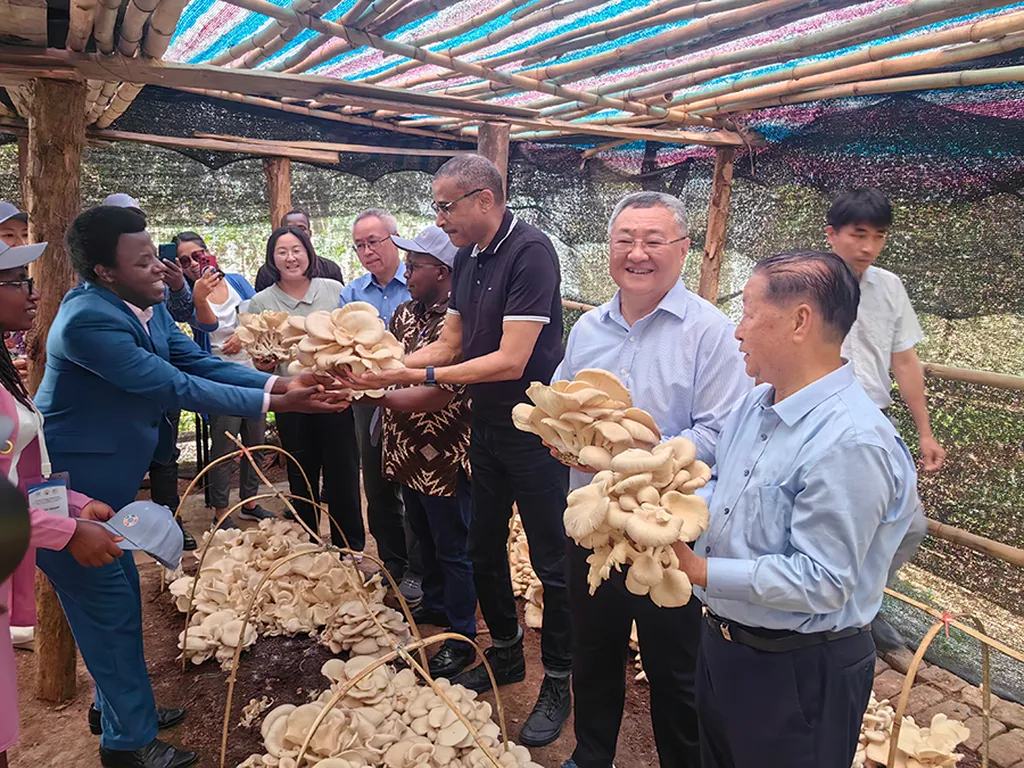In a quiet village on the outskirts of Kigali, Leonidas Mushimiyimana oversees a bustling workshop where trays of freshly harvested mushrooms are carefully dried and ground into fine powder. His enterprise, Deyi Ltd, processes up to 600 kilograms of mushrooms weekly, transforming what was once a niche crop into a thriving agribusiness. Mushimiyimana is among a growing number of Rwandan entrepreneurs who have embraced Juncao technology—a Chinese innovation that uses specially cultivated grass as a substrate for mushroom cultivation—turning it into a tool for economic empowerment and environmental sustainability.
The story of Juncao in Rwanda began over a decade ago, when the China-Rwanda Agriculture Technology Demonstration Center was established in 2011 under a bilateral agreement forged at the Forum on China-Africa Cooperation. The technology, developed in China’s Fujian province in the 1980s, replaces traditional wood-based substrates with fast-growing, nutrient-rich grass, significantly boosting yields while reducing deforestation. What started as a scientific exchange has since evolved into a nationwide movement, reshaping Rwanda’s agricultural landscape and creating opportunities for thousands of farmers, particularly women.
Suzanne Nikuze’s journey mirrors this transformation. After training at the demonstration center in 2018, she launched her own agribusiness in Kigali’s Gasabo district, focusing on training women in mushroom farming. “Women often carry the heaviest household burdens,” she explains, “so I wanted to give them a skill that could lead to financial independence.” Her initiative has trained over 400 young people, 80 percent of them women, with support from the Rwandan government, which offers scholarships to encourage adoption of the technology. Once met with skepticism, mushroom farming is now a mainstream enterprise, offering a low-cost, high-reward path to poverty alleviation.
The impact extends beyond individual livelihoods. Bellancile Uzayisenga, coordinator of the plant and microbial biotechnology program at the Rwanda Agriculture and Animal Resources Development Board, notes that the center has trained over 40,000 farmers since its inception. The introduction of 12 mushroom species—both edible and medicinal—has diversified local diets and created new markets. With mushrooms now incorporated into school feeding programs, demand has surged, prompting the board to train primary school students in cultivation techniques. “This not only secures the supply of a nutritious food source but also instills agricultural skills in the next generation,” Uzayisenga says.
The technology’s environmental benefits are equally compelling. Juncao grass grows rapidly, requires minimal inputs, and eliminates the need for wood-based substrates, easing pressure on Rwanda’s forests. Innovators like Mushimiyimana have taken sustainability a step further by repurposing spent mushroom substrates into green charcoal—a cleaner alternative to traditional firewood. By carbonizing the used material and mixing it with cassava flour, his workshop produces briquettes that reduce emissions and deforestation while providing women with a safer cooking option. “This isn’t just about waste reduction,” he explains. “It’s about creating a circular economy where every byproduct has value.”
The ripple effects of Juncao technology are evident in its economic and social dimensions. Mushimiyimana’s Deyi Ltd collaborates with over 3,500 mushroom growers, purchasing their harvests for processing and export. His products, once approved by the Rwanda Standards Board, will reach regional markets in the Democratic Republic of Congo, Kenya, and Uganda, further integrating Rwanda into East Africa’s agricultural value chains. Meanwhile, the government’s distribution of 10,000 mushroom tubes monthly ensures that more farmers can adopt the technology, scaling up production and income opportunities.
International collaboration has played a pivotal role in this success. Over 2,000 Rwandans have received hands-on training in China, with two pursuing PhDs in Juncao technology—a testament to the depth of knowledge transfer. This exchange has not only enhanced local expertise but also fostered a culture of innovation, where traditional farming meets modern sustainability.
As Rwanda continues to expand its Juncao-based agribusinesses, the technology’s potential to address food security, gender equality, and environmental degradation becomes increasingly clear. For farmers like Nikuze and Mushimiyimana, the “miracle grass” is more than a crop—it’s a catalyst for lasting change.

